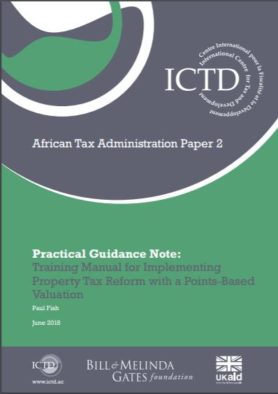African Tax Administration Paper 2
This paper shares the author’s on-going experience in supporting the implementation of property tax reform programmes in smaller urban centres and rural districts in Sub-Saharan Africa, covering more than 12 local governments over a period of more than 10 years. The paper presents a generic training manual, designed to offer practical guidance for property tax reformers on the process of mobilising revenue. The guidance details the process step-by-step together with supporting materials, schedules and examples of survey instruments. Some results, lessons learned, and next steps have previously been published.
Authors
Paul Fish
Paul Fish has been assisting local government initiatives to mobilise revenues through property tax reform since 2006. As part of a team Paul has developed and implemented a reform program as well as directing dedicated software to administer those reforms. He has worked in Sierra Leone, Malawi, Senegal, Ghana, and Uganda. Paul draws on his earlier property valuation experience as principal of consultants Altus Group based in Toronto, Canada.
